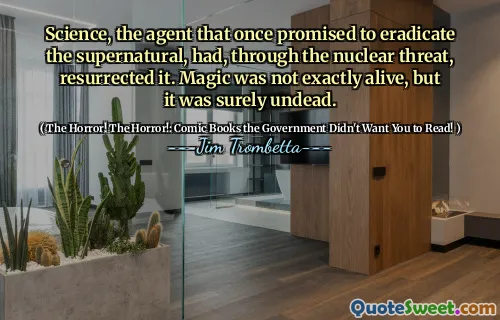
Science, the agent that once promised to eradicate the supernatural, had, through the nuclear threat, resurrected it. Magic was not exactly alive, but it was surely undead.
This quote offers a profound commentary on the paradoxical relationship between science and supernatural belief. It suggests that science, initially championed as the liberator from superstition and mystical fears, has, paradoxically, given rise to new fears that resemble the supernatural – in this case, the threat of nuclear annihilation. The phrase "Science, the agent that once promised to eradicate the supernatural" reflects an era when people believed rationality and empirical knowledge would eventually explain and eliminate all phenomena once attributed to magic or superstition.
However, the advent of nuclear weapons introduced a terrifying capability unlike anything before, infusing science with a sinister power that resembles the very forces it was supposed to demystify. This "resurrection" of the supernatural through scientific means points to a deeper irony: that human innovation can lead to new existential threats that evoke primal fears and a sense of the uncanny or magical. The idea that "Magic was not exactly alive, but it was surely undead" encapsulates this tension – magic, instead of being banished, lingers on but in a mutated, unsettling form inspired by scientific breakthroughs.
The quote invites reflection on how human progress does not always mean liberation from myth and fear but sometimes rebirths them in new forms. It highlights the complex, ambivalent role science plays in society—it is a source of both hope and dread. This perspective encourages us to cautiously engage with powerful technologies, acknowledging that they may unleash consequences reminiscent of ancient fears, reminding us that some mysteries and dangers never fully disappear, but evolve. Such contemplation is especially relevant today as we grapple with the ethical challenges of technological advancements.






